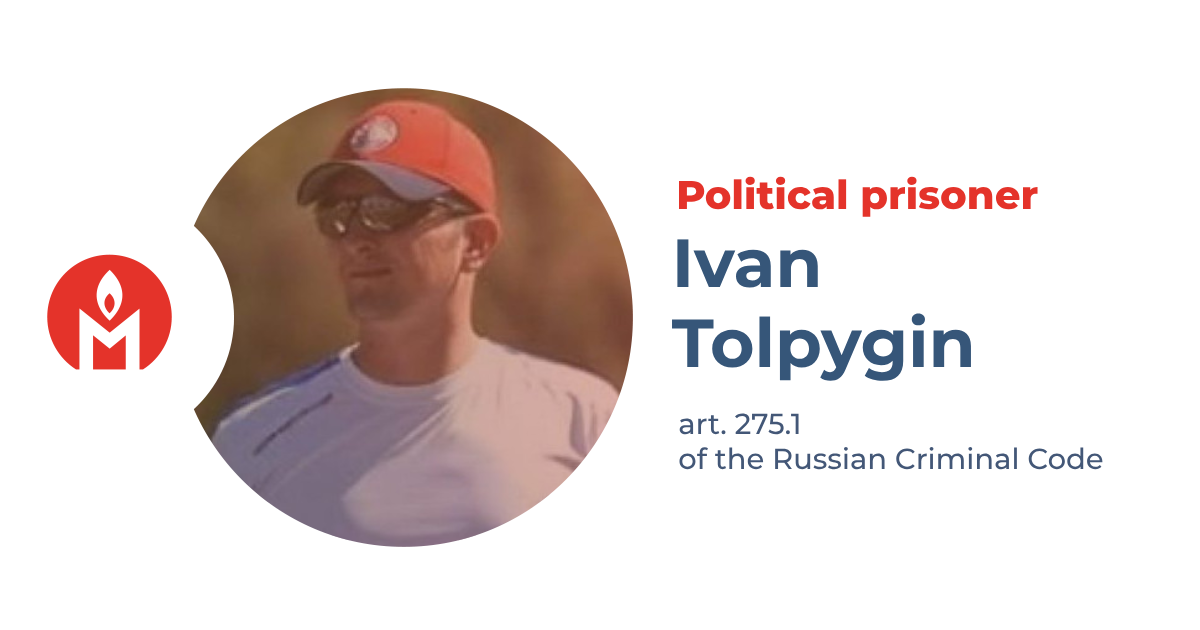Ivan Tolpygin is a political prisoner
A resident of Oryol has been sentenced to four years in a penal colony for correspondence with an FSB agent pretending to be a representative of Ukraine
The ‘Political Prisoners. Memorial’ human rights project, in accordance with international standards, considers Ivan Tolpygin a political prisoner. Tolpygin was convicted of ‘collusion with a foreign state’ for attempting to make contact with a supposed representative of Ukraine who was in fact an FSB agent. Tolpygin’s prosecution and conviction violated his right to a fair trial. We demand the immediate release of Ivan Tolpygin and that all criminal charges against him be dropped.

What were the charges against Ivan Tolpygin?
Motivated by his opposition to the war and his desire to avoid mobilisation, Ivan Tolpygin searched online for information about the Ukrainian project, I Want to Live. At the end of 2023, he was contacted on Telegram by someone calling himself ‘Timur,’ who claimed to be a representative of Ukraine. The two corresponded until February 2024, during which time Tolpygin sent his correspondent photographs of government and industrial sites in Oryol, as well as electronic copies of publicly available medical books.
In reality, ‘Timur’ was an FSB agent. This is stated explicitly in the court judgment. Two months after the correspondence ended, in April 2024, Tolpygin was remanded in custody on a charge of attempted collusion with a foreign state (Article 30, Part 3, in conjunction with Article 275.1, of the Russian Criminal Code). When the case went to court, the charge was changed from ‘attempted’ to ‘completed’ collusion.
On 15 July 2024, Tolpygin was sentenced by the Oryol court to four years in a general regime penal colony and fined 500,000 roubles. On 23 October 2024, the sentence was upheld on appeal.
Why do we consider Ivan Tolpygin a political prisoner?
The article criminalising ‘collusion’ with a foreign state was added to the Criminal Code in July 2022. It has since become yet another of the regime’s instruments to combat ‘internal enemies.’ The law on collusion violates the principle of legal certainty and allows the arbitrary criminalisation of private communications between Russian citizens and foreigners. The law does not criminalise specific actions, but rather the supposed intent to ‘assist’ in some undefined ‘activity.’ This article of the Criminal Code must be rescinded, all related convictions quashed, and ongoing criminal charges dropped.
Ivan Tolpygin’s prosecution was directly related to his anti-war beliefs and his desire to avoid taking part in the war. His conviction resulted from entrapment by the FSB, which is prohibited under both Russian and international law.
There is no proof Tolpygin intended to assist activities by foreigners, directed against Russia’s security, as charged. In reality, he did not communicate with a representative of Ukraine, and the correspondence that formed the basis for the charge was initiated by the Russian security services. Without their involvement, Tolpygin would not have taken the steps later deemed by the court to constitute ‘collusion.’ Moreover, the actions he did take (sending photographs of buildings identifiable on Yandex Maps and copies of publicly available medical books) clearly posed no danger to the public.
A detailed description of the case of Ivan Tolpygin and of our position is available on our website.
Recognition of an individual as a political prisoner does not imply the ‘Political Prisoners. Memorial’ human rights project agrees with, or approves, their views, statements, or actions.
How can you help?
You can write to Ivan Tolpygin at the following address:
RU:
303900, Орловская область, пгт Нарышкино, ул. Заводская, д. 62, ФКУ ИК-5 УФСИН России по Орловской области, Толпыгину Ивану Алексеевичу, 1995 г. р.
EN:
Ivan Alekseevich Tolpygin (born 1995), Penal Colony No. 5, Federal Penitentiary Service for Oryol Oblast, 62 Zavodskaya Street, Naryshkino urban-type settlement, Oryol Oblast, 303900, Russia
You can also send an email using the F-Pismo and ZT services (for payment with Russian bank cards) or PrisonMail (for payment with other bank cards), OVD-Info and Memorial-France (free of charge).
Please note that letters in languages other than Russian are highly unlikely to reach the intended recipient.
You can donate to help all political prisoners in Russia.
